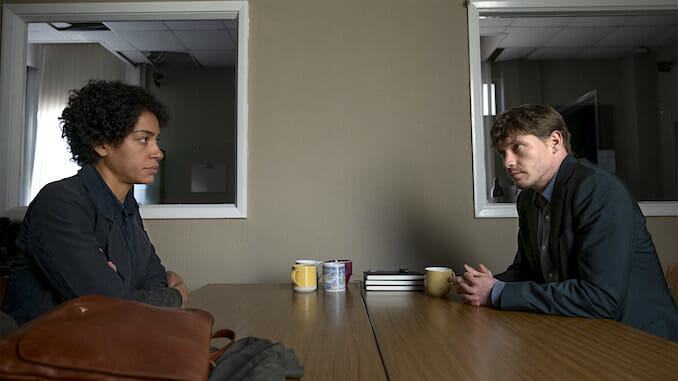The Beast Must Die: AMC’s Initially Taut UK Thriller Quickly Unravels
Photo Courtesy of AMC TV Reviews The Beast Must Die
The UK’s greatest export is crime drama. This tiny island pumps them out at an extraordinary rate, and while not all of them are good, they provide a familiar narrative framework that usually works to their advantage. These series either take place in a small village or London-at-large, any time period. There’s always a hard-nosed DC or DCI with a lot of personal issues who is doggedly pursuing the case under moody coastal skies. An aerial shot of the White Cliffs of Dover are a must, or the Shard if we’re London-bound. The seasons are short, the episodes are emotionally taut, and in the end… well, the ending is what usually makes or breaks it.
Crime show fans know that a good mystery series doesn’t need to break the mold. It doesn’t need to rely on outrageous twists or subvert viewer expectations, not only because very few can pull that off, but because when you tune in for a British crime series you know what you’re getting into and you want specifically that thing. The acting and the character stories are what can make these shows special, but none of it matters if they don’t stick the landing. Above all, a good crime show has to be satisfying. The crime needs to be solved and we need some sense of closure, but the intangibles of greatness require something more.
Enter The Beast Must Die, an emotionally compelling story that follows a London woman, Frances Cairnes (Cush Jumbo), desperate for justice after her son was killed in a hit-and-run on the rural Isle of Wight. Her story is split with that of a young inspector, the Dickensian-named Nigel Strangeways (Billy Howle), who has suffered a recent trauma of his own. As Nigel takes up his new post in the Isle of Wight, he begins quietly looking into the case, uncovering just how badly it was mishandled thanks to the cozy relationship among the island’s elite. Meanwhile, a disillusioned Frances begins her own investigation—clumsily at first, but soon with a pinpoint-precision that allows her to manipulate her way into the lives of the Rattery family, one of whom is responsible for her son’s death.
All of this, coupled with an excellent cast, should have led to a familiarly excellent series. But The Beast Must Die chooses to eliminate the mystery very early on. The murderer is obvious; what’s less obvious is how Frances, and to a much lesser extent Nigel, will be able to prove it. While there are intriguing traces of a psychological thriller, maybe even a horror, that are suggested at this point, none of it is capitalized on. The characters, including Frances and Nigel, exist only to move the plot and—other than one terrible incident in each of their lives—don’t have much interiority or past beyond that. The shallow conception of our leads as well as the wealthy Rattery family makes the show’s ending after just a brisk six episodes all the more disappointing. (Regarding the posh and troubled Ratterys: to waste Jared Harris and Geraldine James is a crime, but Mia Tomlinson also makes a magnetic impression before her character is essentially tossed aside). What’s frustrating is not the implied esoteric nature of what justice really means or if peace after trauma can ever be achieved so much as the fact that none of these character’s stories really seem to get closure. The teases for a good, deep story are all there, but we never go below the surface.
The Beast Must Die is ultimately just trying to do too much, and thus quickly loses its way. What should have been a clear, compelling drama instead becomes muddled as it juggles too many genres, going so far as to make a hard turn in its penultimate episode from a revenge thriller to a mild whodunnit. The worst offense, really, is the nonessential character of Nigel; Howe does everything he can with to make the detective charming and interesting, but the script, bizarrely, is just not that interested in him. It’s a pity, because the show could have clearly forged a path for a series of Strangeway cases, like the novels on which the story is based. Instead, we’re left with a show that loses momentum as it cuts back and forth between the two leads, only one of which is ever interesting (thanks mostly to the sheer will of Cush Jumbo), never connecting them enough to make the final moments have any weight.
Presumably, one of the great benefits of creating a TV miniseries is certainty. There are a finite number of episodes, and therefore, a clear ending. It’s why I’m so much tougher on miniseries when it comes to sticking the landing, particularly if they are based on a novel (which this was). What works or what doesn’t, in that case, should be evident and tested. To miss the mark seems an avoidable misstep. I’ve long championed the resurgence of the miniseries format and shorter TV series, but perhaps six is not often enough to tell a complex story that has the ability to really explore multiple characters with a depth that allows us to care deeply about what comes next (unless you are Mare of Easttown—and even that took seven). Most of the characters in The Beast Must Die are haunted by their pasts, but sadly, the series itself won’t leave much of an impression on us.
The Beast Must Die premieres on AMC Monday, July 12th; new episodes will air weekly ahead of time on streaming services AMC+
Allison Keene is the TV Editor of Paste Magazine. For more television talk, pop culture chat and general japery, you can follow her @keeneTV
For all the latest TV news, reviews, lists and features, follow @Paste_TV.